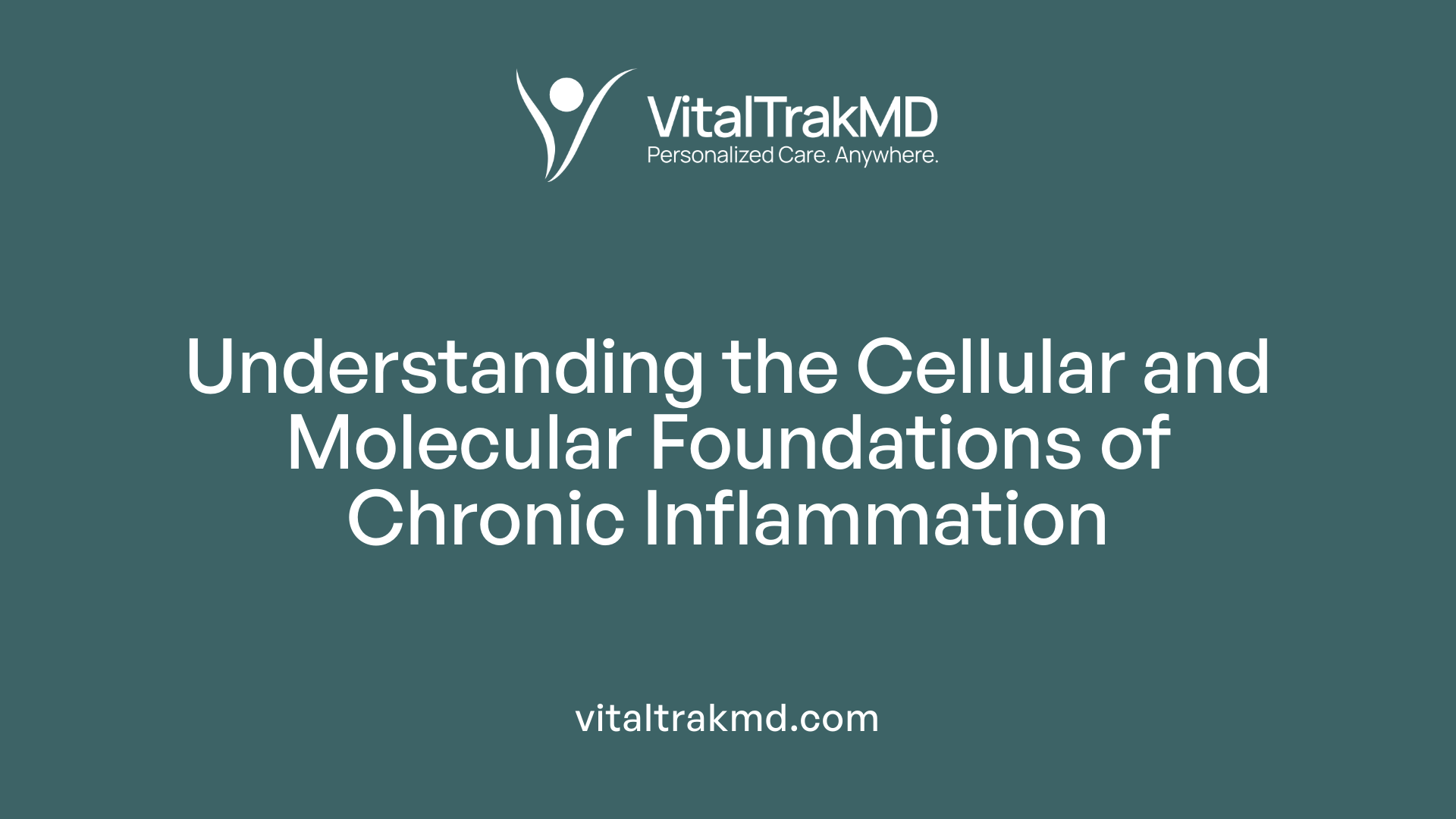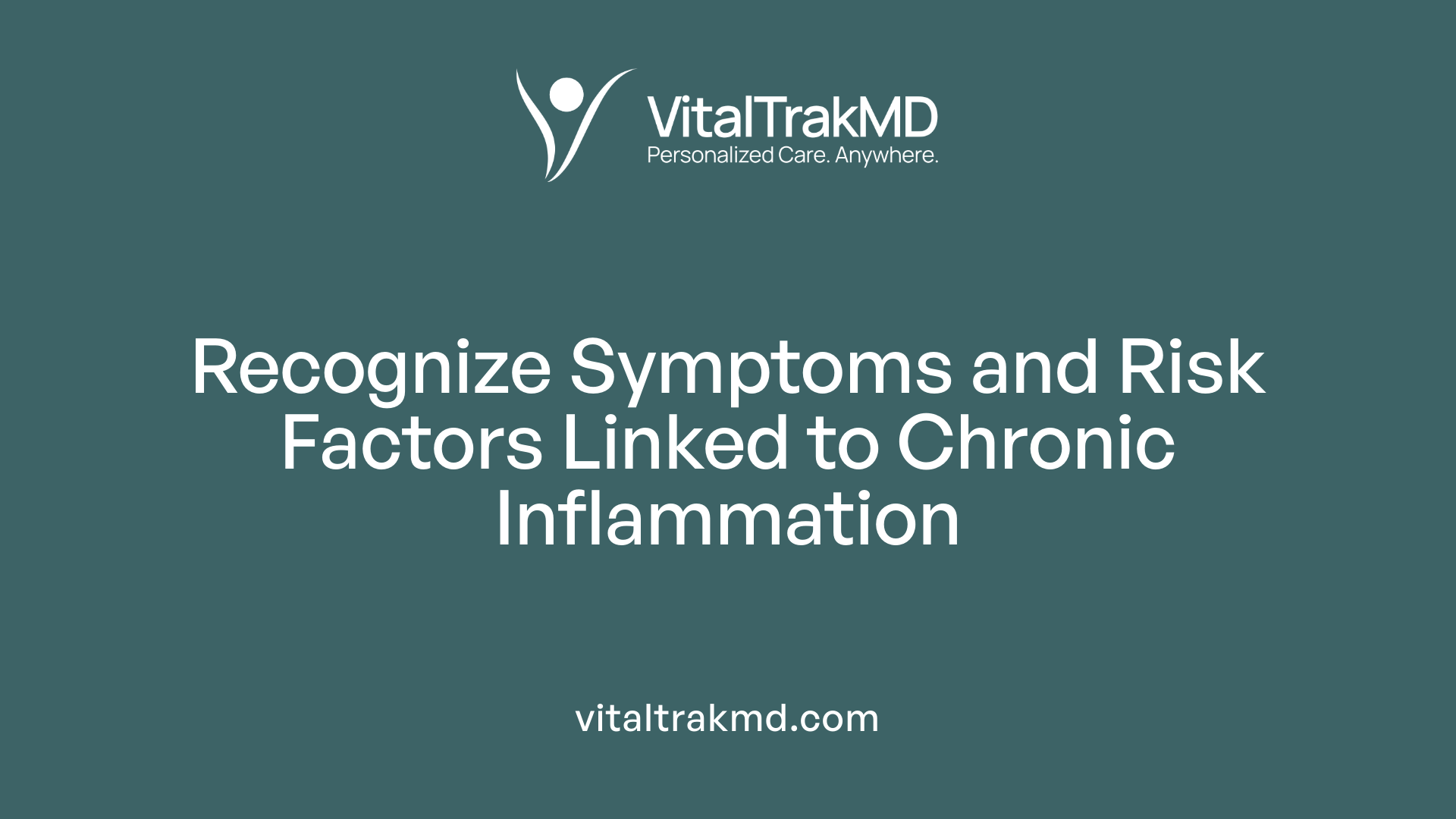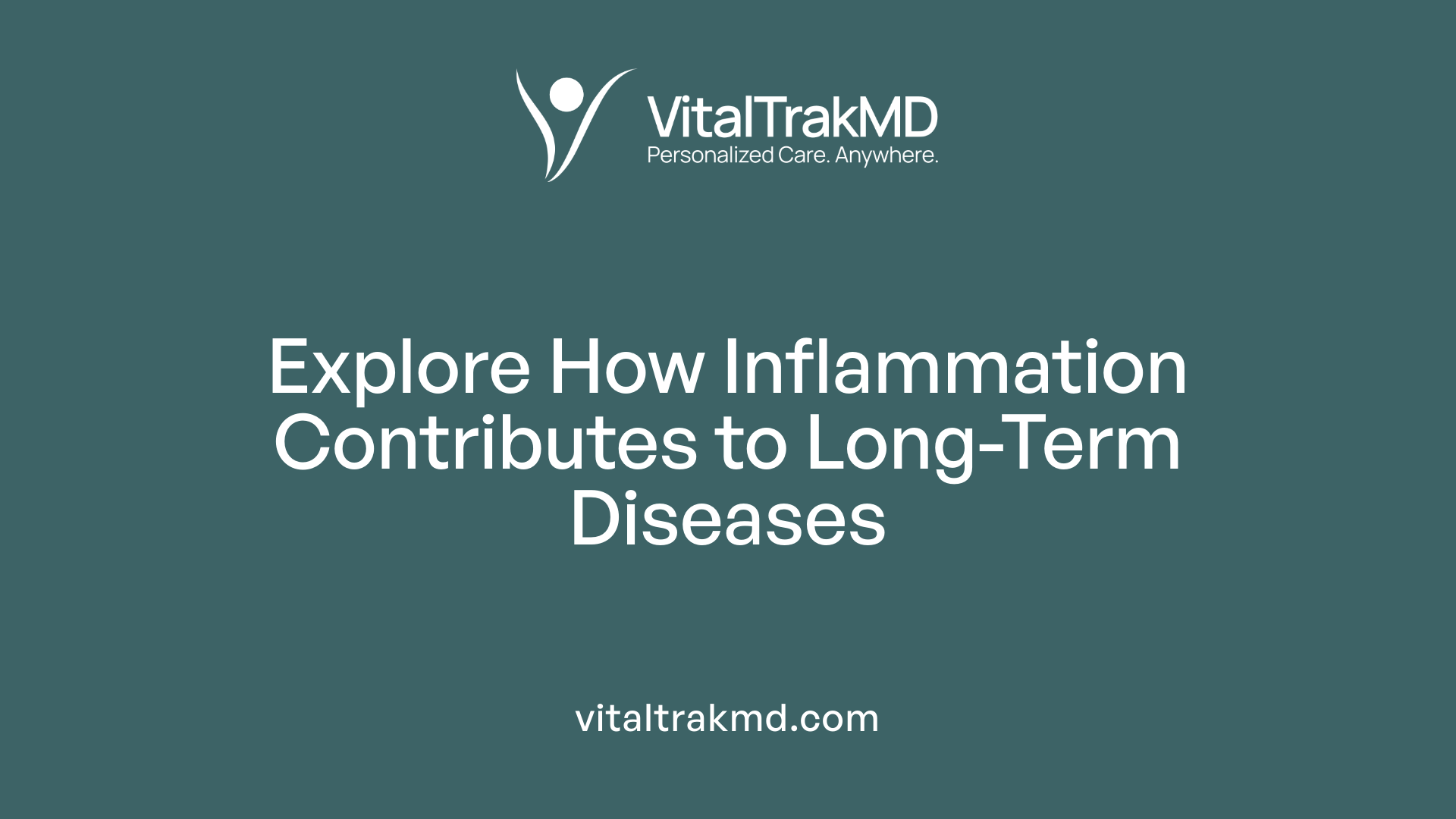Inflammation and Its Link to Chronic Disease

Understanding the Crucial Role of Inflammation in Chronic Disease
Inflammation is a vital part of the body's immune response, essential for healing and recovery from injuries and infections. However, when inflammation becomes persistent and systemic, it transforms from a protective mechanism into a significant contributor to a wide array of chronic diseases. This article explores the biological mechanisms linking inflammation to chronic diseases, examines contributing factors, and discusses strategies for management through lifestyle and therapeutic interventions.
The Biological Nature of Chronic Inflammation

What are the biological mechanisms linking inflammation to chronic diseases?
Chronic inflammation is driven by complex biological processes involving persistent immune activation and signaling pathways. Unlike acute inflammation, which is short-term and aimed at healing injuries or fighting infections, chronic inflammation continues over months or years, often damaging healthy tissues.
At the cellular level, immune cells such as macrophages, lymphocytes, and fibroblast-like synoviocytes infiltrate tissues, releasing cytokines and growth factors. These signaling molecules, including IL-1β, IL-6, and TNF-α, promote ongoing inflammation, tissue remodeling, and, ultimately, disease progression.
Several key pathways regulate these processes:
| Pathway | Role in Inflammation | Receptors and Key Mediators | Impact on Disease |
|---|---|---|---|
| NF-κB | Transcription of inflammatory cytokines, adhesion molecules, and survival genes | Toll-like receptors (TLRs), cytokine receptors | Promotes immune cell activation; linked to cancer, cardiovascular disease |
| MAPK | Activation of cytokine production and cellular responses to stress and inflammation | Receptor tyrosine kinases, cytokines | Contributes to autoimmune diseases and chronic tissue injury |
| JAK-STAT | Cytokine signaling leading to immune cell proliferation and differentiation | Cytokine receptors, STAT proteins | Involved in autoimmune disorders and certain cancers |
These pathways are triggered by pattern recognition receptors such as toll-like receptors (TLRs), which recognize pathogen-associated molecular patterns (PAMPs) and danger-associated molecular patterns (DAMPs). Persistent activation of these pathways promotes infiltration of immune cells, cytokine release, and tissue damage.
Over time, this ongoing inflammatory response can cause DNA damage, activate matrix metalloproteinases that degrade tissue, induce fibrosis, and lead to abnormal cell growth. This environment fosters the development of diseases such as cardiovascular disorders, diabetes, and malignancies.
The dysregulation of these signaling pathways can also result in immune system errors, leading to autoimmune conditions or tumor growth. Factors like aging, poor diet, stress, and environmental exposures influence the activation and regulation of inflammation, further linking biological processes to disease outcomes.
Understanding these mechanisms provides insights for developing targeted therapies aimed at modulating inflammatory pathways, thus preventing or treating chronic diseases associated with long-term inflammation.
Factors Promoting Chronic, Low-Grade Inflammation

What factors contribute to chronic inflammation?
Chronic inflammation arises from a variety of interconnected factors that keep the immune system in a prolonged state of activation. Persistent infections that the body cannot clear, such as tuberculosis, certain fungi, or parasitic infections, continuously stimulate immune responses, leading to sustained inflammation.
Environmental exposures also play a significant role. Exposure to irritants like silica dust, industrial chemicals, and urban pollutants can cause ongoing tissue irritation and immune activation. These environmental chemicals are common in many workplaces and polluted areas, contributing to long-term inflammatory responses.
Autoimmune diseases, such as rheumatoid arthritis and lupus, involve the immune system mistakenly attacking healthy tissues. This autoimmune activity results in continuous inflammation that damages tissues and organs over time.
Lifestyle choices are substantial contributors to chronic inflammation. Diets high in processed foods, sugars, saturated and trans fats promote inflammatory pathways. Obesity, especially visceral fat accumulation, produces inflammatory cytokines and immune signals that perpetuate low-grade inflammation. Chronic psychological stress, smoking, excessive alcohol consumption, and irregular or insufficient sleep further exacerbate this condition.
Biochemical factors like oxidative stress, mitochondrial dysfunction, and imbalances in gut microbiota also sustain inflammation. Oxidative stress damages cells and tissues, prompting a constant immune response. Mitochondrial issues impair cellular energy production, which can activate inflammatory pathways. Disrupted gut microbiota composition—known as dysbiosis—can lead to increased intestinal permeability and systemic inflammation.
Understanding these diverse causes highlights how lifestyle, environment, and biological processes intertwine in the development and persistence of chronic inflammation. Managing these factors through healthy lifestyle choices and reducing exposure to harmful agents can help lower the risk of long-term inflammatory diseases.
Symptoms and Risk Factors of Chronic Inflammation

What causes, symptoms, and risk factors are associated with chronic inflammation?
Chronic inflammation develops from a complex mix of triggers, including persistent infections, autoimmune reactions, exposure to environmental toxins, unhealthy diet choices, obesity, and prolonged stress. Unlike acute inflammation, which is a short-term, beneficial response to injury or infection, chronic inflammation persists over months or years, continuously damaging tissues.
The symptoms of chronic inflammation are often subtle and can be mistaken for other health issues. Common signs include persistent fatigue, joint and muscle pains, gastrointestinal disturbances, skin rashes, and mood disorders such as depression. People may also experience recurrent infections or irregular sleep patterns.
Risk factors that increase the likelihood of developing chronic inflammation encompass obesity, smoking, diets high in processed foods, trans fats, and sugars, as well as low physical activity levels. Aging, stress, and poor sleep habits also contribute.
Persistent inflammation is linked to the development of several severe conditions. These include cardiovascular diseases like atherosclerosis, metabolic disorders such as type 2 diabetes, autoimmune diseases like rheumatoid arthritis, and certain types of cancer. Managing these risk factors through lifestyle changes and medical interventions can significantly reduce long-term health risks.
| Causes of Chronic Inflammation | Common Symptoms | Major Associated Diseases |
|---|---|---|
| Persistent infections | Fatigue | Heart disease |
| Autoimmune conditions | Joint pain | Diabetes |
| Environmental toxins | Gastrointestinal issues | Cancer |
| Poor diet | Skin rashes | Autoimmune disorders |
| Obesity | Mood disturbances | Neurodegenerative diseases |
| Chronic stress | Recurrent infections |
Managing Chronic Inflammation: Dietary and Lifestyle Strategies
What strategies can help manage chronic inflammation through diet and lifestyle changes?
Managing chronic inflammation involves a comprehensive approach that includes both dietary adjustments and lifestyle modifications. A fundamental strategy is adopting an anti-inflammatory diet, rich in nutrient-dense foods such as fruits, vegetables, whole grains, nuts, seeds, and fatty fish high in omega-3 fatty acids. These foods contain antioxidants and anti-inflammatory compounds that help counteract systemic inflammation.
Conversely, it's important to limit or completely avoid foods that promote inflammation. This includes processed foods, red and processed meats, baked goods made with white flour, trans fats, and foods high in added sugars. These items can stimulate inflammatory pathways and exacerbate health issues.
Incorporating specific spices like turmeric, which contains curcumin, and ginger can provide additional anti-inflammatory benefits. Regular physical activity is another crucial element; even as little as 20 minutes of moderate exercise can help reduce inflammation markers such as C-reactive protein.
Maintaining a healthy weight is critical, as obesity is strongly linked to chronic low-grade inflammation driven by immune cell activation and cytokine production. Stress management techniques, such as mindfulness, meditation, and adequate sleep, also play vital roles—they help regulate hormonal and immune responses that affect inflammation.
Supporting gut health through the consumption of probiotic-rich foods like yogurt and fermented vegetables, along with prebiotics like garlic and onions, can improve microbiome diversity. Since the gut microbiota influence immune responses and inflammation, a healthy microbiome can significantly reduce systemic inflammatory processes.
Finally, lifestyle habits should be optimized by avoiding smoking, limiting alcohol intake, and minimizing exposure to environmental toxins. Together, these strategies form a practical blueprint that can lower chronic inflammation, thereby decreasing the risk for diseases such as cardiovascular disease, diabetes, and certain cancers.
Implementing these dietary and lifestyle changes not only alleviates inflammation but also promotes overall health and well-being, making them essential components of preventive healthcare.
Biological Pathways and Their Role in Disease Development
How does inflammation influence the development and progression of various chronic health conditions?
Inflammation begins as a protective response to injuries or invaders like germs, helping the body fight infections and promote healing. Acute inflammation is short-term and beneficial, characterized by immune cell activation, increased blood flow, and the release of signaling molecules such as cytokines.
However, when inflammation persists without resolution—a condition known as chronic inflammation—it can turn harmful. This prolonged response involves various immune cells, including macrophages, lymphocytes, and fibroblast-like synoviocytes, which continue to release cytokines like IL-1β, IL-6, and TNF-α. These substances can damage tissues, promote fibrosis, and induce DNA mutations.
Chronic inflammation contributes to numerous diseases. In cardiovascular disorders, persistent inflammation damages the arterial lining, leading to plaque buildup and increasing the risk of heart attacks and strokes. In cancer, DNA damage caused by inflammatory mediators promotes genetic mutations that facilitate tumor growth. Neurodegenerative diseases such as Alzheimer’s involve neuronal injury driven by sustained inflammatory signals.
This ongoing immune activity can also impair tissue repair, resulting in fibrosis and loss of normal tissue function. Over time, the combined effects of cellular damage, DNA mutations, and tissue remodeling create a vicious cycle that accelerates disease progression.
Understanding how inflammation activates biological pathways that lead to DNA damage, fibrosis, and cell growth emphasizes the importance of controlling inflammation. Targeting these pathways with therapies like cytokine inhibitors or microbiome modulation could slow or prevent the development of chronic, inflammatory-driven diseases.
Inflammation’s Role in Specific Long-term Diseases

What is the role of inflammation in specific diseases such as cancer and other long-term conditions?
Inflammation is a natural part of the body’s immune response, helping to fight infections and heal tissues after injury. However, when inflammation becomes chronic, it can turn harmful and contribute to the development of long-term diseases such as cancer, autoimmune disorders, and cardiovascular conditions.
In cancers, persistent inflammation can cause DNA damage, promote blood vessel growth (angiogenesis), and enable tumor cells to evade immune detection. This process involves immune cells like macrophages and cytokines such as IL-6, TNF-α, and IL-1β, which can support tumor growth and spread. In autoimmune diseases, immune system dysregulation leads to attacking healthy tissues, driven by cytokines and immune cells like lymphocytes and fibroblast-like synoviocytes.
Cardiovascular diseases, including atherosclerosis, involve inflammation that damages arterial walls, promotes plaque formation, and increases the risk of blood clots, leading to heart attacks and strokes. Key players are cytokines, immune cells, and signaling molecules that drive inflammation within blood vessels.
The mechanisms connecting chronic inflammation to these diseases often involve DNA damage, oxidative stress, immune cell activation, and tissue remodeling. The resulting tissue damage and immune dysregulation further perpetuate the inflammatory cycle, worsening disease progression.
Understanding these pathways offers promising avenues for targeted therapies. For example, drugs that block cytokines like TNF-α and IL-6, or inhibit inflammatory pathways such as the NLRP3 inflammasome, are being explored to treat these chronic conditions. Preventing or reducing chronic inflammation can significantly impact the management and outcomes of these diseases, making inflammation control a vital component of long-term health strategies.
| Disease Type | Inflammatory Features | Main Immune Players | Pathways and Cytokines Involved |
|---|---|---|---|
| Cancer | DNA damage, immune evasion, tumor growth | Macrophages, T-cells, cytokines IL-6, TNF-α, IL-1β | NF-κB, NLRP3 inflammasome |
| Autoimmune | Tissue destruction, chronic immune activation | Lymphocytes, fibroblast-like synoviocytes | Cytokines IL-17, IL-23, TNF-α |
| Cardiovascular | Vessel damage, plaque formation | Monocytes, macrophages, cytokines IL-6, TNF-α | NF-κB, cytokine signaling |
Recognizing how inflammation influences these diseases is essential for developing targeted treatments and preventive measures to improve long-term health outcomes.
Health Implications and Future Directions in Inflammation Research

What are the health implications of systemic chronic inflammation?
Systemic chronic inflammation plays a significant role in the development of many serious health conditions. It contributes to the progression of cardiovascular diseases by damaging arterial linings, promoting plaque accumulation, and increasing the risk of blood clots that can lead to heart attack or stroke.
Chronic inflammation is also linked to various cancers, including colorectal and liver cancer, especially in individuals with inflammatory bowel disease or viral hepatitis. It damages DNA and tissue, creating an environment conducive to tumor growth.
Autoimmune disorders such as rheumatoid arthritis, lupus, and other inflammatory diseases involve continuous immune attacks on healthy tissues, driven by persistent inflammation.
Metabolic conditions like type 2 diabetes are associated with elevated cytokines and inflammatory pathways that cause insulin resistance and weight gain, fueling a vicious cycle. Moreover, neurodegenerative diseases—including Alzheimer’s and Parkinson’s—are increasingly linked to chronic brain inflammation.
Symptoms may be subtle and include fatigue, joint pain, mood changes, or digestion issues, often making it difficult to diagnose early without specific blood tests. Biomarkers like high-sensitivity C-reactive protein (CRP) and fibrinogen are used to detect systemic inflammation, although they are not disease-specific.
Chronic inflammation also impacts mental health, contributing to depression and anxiety, and is associated with accelerated aging and decline in overall physiological functions. Managing this condition involves a combination of lifestyle changes, diet, and medications to mitigate its widespread health effects and reduce the burden of related diseases.
The Path Toward Personalized Preventive and Therapeutic Strategies
Emerging research continues to unravel the complex mechanisms linking inflammation to chronic disease, revealing promising avenues for early diagnosis, targeted therapies, and personalized lifestyle interventions. Recognizing the impact of modifiable risk factors such as diet, stress, and physical activity underscores the importance of holistic approaches to prevent and manage chronic inflammation. As science advances, integrating biomarker monitoring and individual health profiles will enhance our ability to combat these pervasive health threats effectively.
References
- Inflammation: The Cause of All Diseases - PMC
- What Is Inflammation? Types, Causes & Treatment
- Chronic inflammation in the etiology of disease across ...
- Chronic Inflammation - StatPearls
- Understanding acute and chronic inflammation
- Editorial: Inflammation and chronic disease
- Chronic inflammation: What it is, why it's bad, and how you ...
- How Inflammation Affects Your Health
- Risk Factors: Chronic Inflammation
- Chronic Inflammation - StatPearls
Recent articles
Want to Feel Better and Live Healthier?
Join hundreds of patients taking control of their health with personalized care that fits their life – not the other way around.
Rated 4.8/5 by 32+ customers







